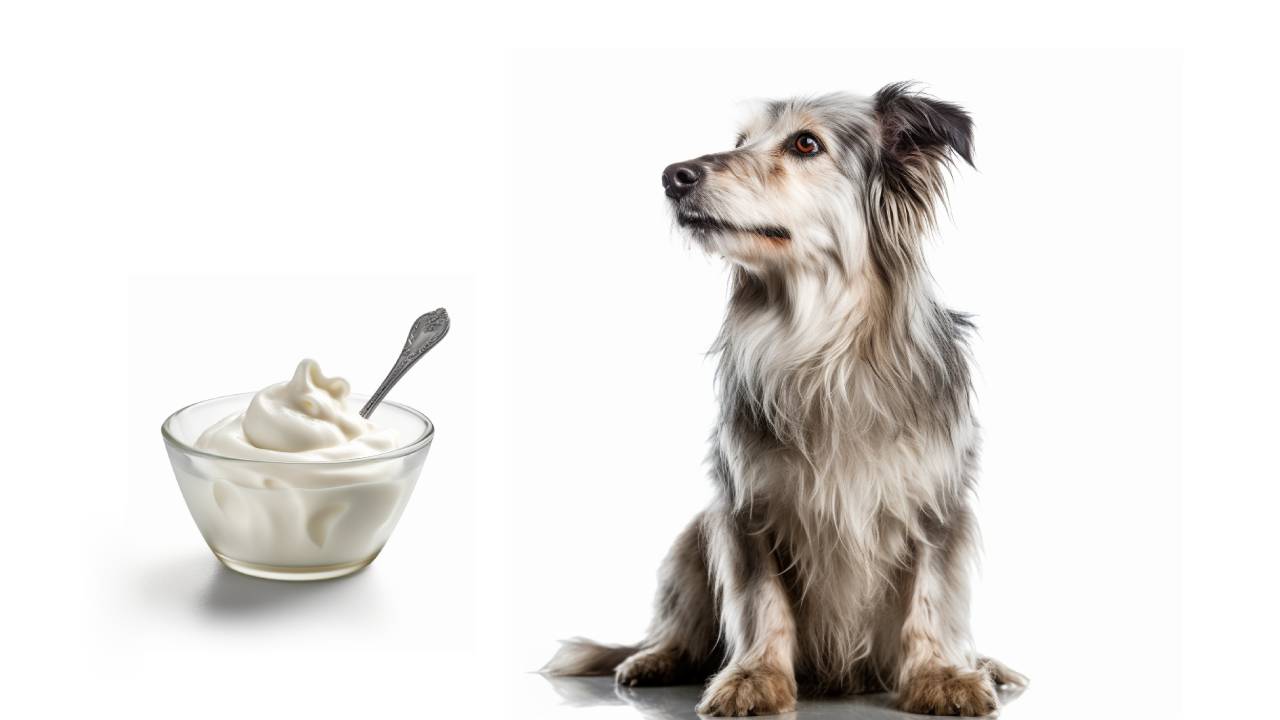Many pet owners wonder if yogurt is a suitable addition to their dog’s diet. The short answer is yes, but there are essential considerations to remember. In this article, we’ll delve into the potential benefits of feeding your dog yogurt, highlight its associated risks, and provide guidelines to ensure your canine companion enjoys this dairy delight safely.
Is Yogurt Good For Dogs?
Yogurt’s potential benefits for dogs stem from its probiotic content. Probiotics are live bacteria that provide numerous health advantages, particularly for digestive health. Just as in humans, these beneficial bacteria can aid in maintaining a balanced gut flora in dogs, supporting smoother digestion and potentially enhancing their immune system.

One of the primary reasons yogurt is considered good for dogs is its ability to alleviate gastrointestinal issues. If your dog is experiencing digestive upset due to factors like a change in diet or antibiotics, introducing plain, unsweetened yogurt can help restore a healthier balance of gut bacteria.
The probiotics in yogurt counteract harmful bacteria and create a more favorable environment in the digestive tract.
What Kind of Yogurt Can Dogs Eat?
When it comes to choosing yogurt for your dog, it’s crucial to opt for varieties that are safe and beneficial for their health. Here are the types of yogurt that dogs can eat
- Plain, Unsweetened Yogurt: Plain yogurt without added sweeteners, flavors, or artificial additives is the best dog choice. Look for yogurts with minimal ingredients, ideally just milk and live active cultures.
- Greek yogurt is suitable for dogs due to its higher protein content than regular yogurt. The thicker consistency of Greek yogurt can make it a more enjoyable treat, and its protein content can provide an extra nutritional boost.
- Yogurt with Live Active Cultures: The live active cultures present in yogurt provide probiotic benefits. Look for yogurt that specifically mentions containing live cultures like Lactobacillus acidophilus and Bifidobacterium.
- Low-Fat or Non-Fat Varieties: Opting for low-fat or non-fat yogurt can be beneficial, especially if your dog needs to manage weight.
- Organic Yogurt: Choosing organic yogurt can be a good way to minimize potential exposure to pesticides and antibiotics that might be present in conventionally produced dairy products.
Benefits of Feeding Your Dog Yogurt
Yogurt can offer several notable benefits to dogs when incorporated into their diet safely and controlled. The key lies in understanding how yogurt’s properties can positively impact your furry friend’s health and well-being.
- Digestive Health: One of the primary benefits of yogurt for dogs is its potential to support digestive health. Yogurt contains live probiotic cultures, such as Lactobacillus and Bifidobacterium, which are beneficial bacteria that help maintain balanced gut flora.
- Boosеing the Immune System: The gut plays a significant role in the immune system’s function, and a healthy gut microbiome can positively impact the immune response. The probiotics found in yogurt can enhance the gut’s ability to defend against harmful pathogens and promote immune system activity.
This can be particularly valuable for dogs with weakened immune systems, elderly dogs, or those recovering from illnesses.
- Support During Antibiotic Treatment: Antibiotics, while effective at fighting infections, can also disrupt the balance of beneficial gut bacteria. This disruption can lead to digestive issues and a weakened immune system.
Introducing yogurt with live probiotics during and after a course of antibiotics can help restore the gut’s natural balance and aid in minimizing the negative side effects of antibiotic use.
- Improved Nutrient Absorption: A healthy gut with a well-balanced microbiome is better equipped to absorb and utilize nutrients from food.
This means that the nutrients in your dog’s regular diet, including essential vitamins and minerals, can be more effectively absorbed and utilized by their body when supported by a healthy gut environment.
Hazards of Feeding Dogs Yogurt
While yogurt can benefit dogs, specific hazards and considerations are associated with feeding it to your furry companion. Awareness of these potential risks can help you decide whether or not to include yogurt in your dog’s diet.
- Lactose Intolerance: Like some humans, many dogs can also be lactose intolerant, which means they lack the necessary enzymes to digest lactose properly, the sugar found in milk products. After consuming yogurt, lactose-intolerant dogs may experience digestive discomfort, including gas, bloating, and diarrhea.
- Artificial Additives and Sugars: Flavored or sweetened yogurts frequently incorporate additives, artificial sweeteners such as xylitol, and excessive sugar content. These additional ingredients can pose health risks for dogs, potentially leading to severe health complications.
- Digestive Upset and Allergies: Even if your dog is not lactose intolerant, introducing yogurt abruptly or excessively can still lead to digestive upset. Sudden dietary changes can disrupt your dog’s stomach and lead to vomiting, diarrhea, or an upset stomach.
- Weight Management: Yogurt can be calorie-dense, especially if it’s flavored or contains added ingredients. Overfeeding yogurt without accounting for its calorie content can contribute to weight gain, especially if your dog already has weight management issues.

How Much Yogurt Can I Give My Dog?
The amount of yogurt for your dog depends on several factors.
As a general guideline, start with a small portion to assess your dog’s tolerance and response. A teaspoon of yogurt can be a reasonable starting point for small dogs, while larger dogs might be given a tablespoon.
Watch for any signs of digestive upset or adverse reactions after introducing yogurt. If your dog tolerates it well, you can gradually increase the portion size, always staying within moderation.
However, it’s essential to consult your veterinarian for personalized advice, as portion sizes can vary based on your dog’s size, age, health condition, and overall diet.
Conclusion
When chosen and offered thoughtfully, yogurt can be a nutritious and delicious treat for your dog. Stick to plain, unsweetened varieties and be cautious of potential allergens or harmful additives.
In moderation, yogurt can contribute to your dog’s well-being by supporting digestion and providing valuable probiotics. As always, consult your veterinarian before introducing new foods to your dog’s diet.

FAQs
Is Greek yogurt better for dogs than regular yogurt?
Greek yogurt’s higher protein content can make it a good choice for dogs, but ensure it’s plain and without additives.
Can puppies eat yogurt?
Puppies can eat yogurt in moderation, but their digestive systems are sensitive. Introduce it slowly and watch for any adverse reactions.
How often can I give yogurt to my dog?
Offering yogurt as an occasional treat is advisable. Frequent consumption might lead to weight gain or digestive problems.
Are frozen yogurt treats safe for dogs?
Frozen yogurt treats can be a refreshing option, but ensure they contain safe ingredients and aren’t high in sugar.
Can yogurt help with my dog’s bad breath?
The probiotics in yogurt might contribute to better breath by promoting gut health, but other dental care is still necessary.






my dog loves yogurt, especially as a frozen treat on hot days
Yogurt is a hit with my pup, Bella. Do you have any favorite dog-friendly yogurt brands